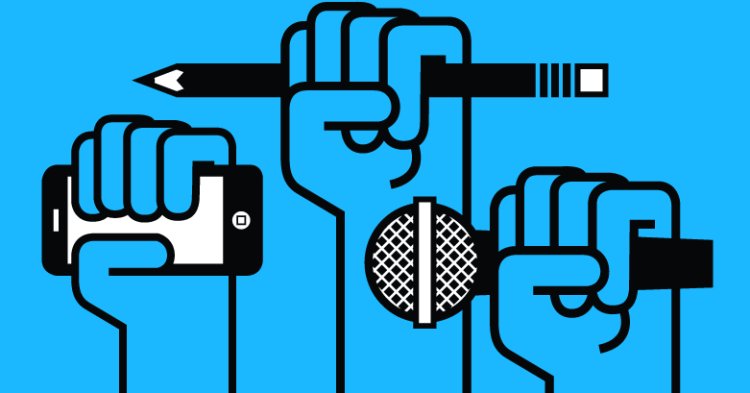Théo Boucart and Jérôme Flury: Le Taurillon
A few months ago, Europe – Rallumer les étoiles (‘Europe – Rekindle the Stars’) was published. Co-authored by André Gattolin, the Vice-President of the European Affairs Committee in the French Senate, the book aims to raise awareness in France on the biggest crisis the European Union is currently facing. That is, the fact that the founding fathers of European integration succeeded in creating a European single market, but were less successful in helping citizens feel like Europeans. During an interview with Le Taurillon, André Gattolin went even further in his analysis: “France has been the country most influenced in terms of different European historical, political, and cultural tendencies. And yet, we haven’t really taken advantage of this.”
It cannot be denied that the French media landscape is one of the areas where this lack of ‘Europeanness’ is most visible. Not a single French TV channel broadcasted Ursula von der Leyen’s speech regarding the State of the Union. Several studies regarding the matter have been carried out and have led to the same conclusion: it would seem that European topics are largely ignored by the French media. Last month, the French sections of the European Movement and the Association of the European Journalists published an open letter to publicly criticise the situation and suggest various solutions. Earlier this year, a poll found that only a third of French people considered themselves as “well, or very well-informed” on European topics. In 2019, a study carried out by the Fondation Jean-Jaurès revealed that Europe only accounted for 3% of airtime during televised news reports in France. The problem also concerns newspapers: the Libération used to include a supplement on Europe (‘Cahier Europe’), but it was withdrawn only a couple years after its launch.
However, the problem is not only quantitative: it is also qualitative. André Gattolin, a former journalist, regrets that his colleagues are increasingly less able to analyse the mysterious workings of the power in Brussels. This has serious consequences, as they are not capable of debunking fake news on Europe circulated by politicians. In addition, French correspondents in Brussels are confronted with the daunting task of explaining highly complex European topics to a largely uninformed readership. In order to make such topics more accessible, national newspapers often adopt national (and even nationalist) perspectives rather than a trans-European one, preventing the creation of a pan-European debate and democracy.
Madelaine Pitt: The New Federalist
With the Brexit clock ticking more loudly and ominously than ever, it’s ironic that London-headquartered media outlets topped the latest EU Media Poll, which ranks the most influential sources of information amongst EU decision-makers. The Financial Times pipped Brussels-based POLITICO to the post, while The Economist and the BBC came in third and fourth respectively. While this poll measures influence within the Brussels bubble of MEPs, EU officials and NGOs specifically rather than a wider public, it still highlights the importance of English-language media for diffusing information in European and international contexts between people with different mother tongues.
In stark contrast, however, it’s almost superfluous to state that coverage of European issues in the UK context is extremely poor. Further warped in recent years by the messy process of agreeing departure terms, reporting on European issues has long been skewed by corporate-owned tabloids, which, unlike the quality broadsheets and broadcasters cited above, dominate domestic sales. With staggeringly little ambition to adhere to principles of quality journalism, including distinguishing between what is true and what is false, especially when echoing Conservative MPs, such publications ensured years of headlines awash with Eurosceptic sentiment and, indeed, misinformation. The image of Europe in the British media of what Europe does, and what it means, was always moulded by a British perspective, and a very biased one at that.
It’s already too late, but in the UK and beyond, we urgently need more and better coverage of European issues with European perspectives. What if British voters had understood, not only that do we not spend £350 million a week on EU membership, but also how European budgets are organised and spent? What if we had grasped that the collective money pot does not vanish into thin air in Brussels, but goes towards cohesion policy, ensuring smooth running of the single market, and many more causes with a mutual benefit for all - and what this mutual benefit can do for regions and citizens throughout the continent? With such influential British, European and international English-language media flourishing in the Brussels bubble, domestic-based British media have no excuse for not being better informed on European issues, and providing coverage that allows British readers to relate to other Europeans’ anxieties, successes, livelihoods, realities and identities.
Julia Bernard: Treffpunkteuropa
Type ‘Europa’ and ‘Krisen’ (‘Europe’ and ‘crisis’) into an internet search engine in Germany and you will find a website dedicated purely to European ‘crises’, namely Brexit, the so-called ‘European refugee crisis’, the rise of nationalism, and the EU’s ongoing battle against terrorism. While you might assume that this website is run by just another Eurosceptic (although pro-Europeans are obviously free to criticise the Union too), the website is a product of the ZDF, Germany’s national public television broadcaster, that has been the most watched German TV broadcaster for years. The website ‘europas-krisen.zdf.de’ (‘Europe’s Crises’) is solely dedicated to Europe’s hardships. The broadcaster has been reporting on the European Union for decades, but when one looks at the greyish and very problem-oriented style in which Europe’s pressing issues are depicted, one cannot help but wonder how German media contributes when it comes to explaining rather than adding to political division. Is German media painting a bleak picture of the EU?
When it comes to media coverage of the EU, most Member States have shown a strong tendency to cover European news through a national lens. For example, a report, published in 2009, that examined German media coverage of the ‘European debt crisis’ illustrated the strong nationalist view prevailing in most German media outlets. Indeed, the debt crisis, which gripped several Eurozone Member States, was portrayed as a conflict between Greece and Germany. Most of the time, complexity was reduced to Merkel vs. Tsipras and their ‘political and economic duels’. Through one-sided reporting, a large proportion of German media outlets not only contributed to the division, but actually undermined the EU’s institutional problem-solving capacity.
Today the situation has undeniably evolved: in 2019 German national broadcasters aired a European Spitzenkandidaten election debate during prime time. Furthermore, issues such as the climate emergency and health care have significantly helped the EU make the headlines – and not only in negative terms.
Nevertheless, structural deficits prevail. German correspondents in Brussels are confronted with the mammoth task of making highly involved issues accessible to a largely ill-informed public. In addition, in order to attract attention, media sources favour national over transnational or truly European perspectives, and in doing so, a striking pattern becomes visible: problems are Europeanised, while moments of success, albeit rarely depicted, are nationalised.
Davide Iannace: Eurobull
Houston, we have a problem. The reality is harsh for whoever reads or listens to contemporary Italian mass media. Articles, often written badly with sensationalist titles, are launched onto social media platforms as bait for indifferent readers. We are bombarded with unspecific, inaccurate content which, most of the time, favours opinions over facts. While independent journalists, small webzines and magazines continually try to offer a reliable service to the public, the general media panorama is bleak.
The European Union is probably one of the most disregarded topics in the media. News outlets fail to discuss European matters and, when they do, they lack the adequate tools to discuss and explain the functioning of this incredibly complex institution. It is often labelled as a technocracy, distanced and closed off from the rest of Europe in its offices in Brussels. However, this could not be further from the truth.
The lack of general understanding has a cascade effect on the readers and listeners themselves. It is clear that we need to change how the European Union is depicted, addressing all of its critical issues but also stressing the Union’s positive influence. It goes without saying that complete impartiality in the media is essentially impossible; despite their best efforts, media outlets will always lean towards one end of the political spectrum.
Nevertheless, it is certainly possible to do better. It is possible to discuss the EU to a greater extent, but also in a more accurate way, depicting the institutions for what they really are. Not a technocracy, but representation of European citizens and their countries. Governments, for now, make decisions on Europe and its policies and the European Parliament is elected directly by European citizens. We cannot consider ourselves as outsiders to the European Union, because we are directly part of it.
Being part of the EU means accepting how important and relevant it is to our lives. In a democracy, people have the right and the duty to be informed about the ongoing political process. In Europe, this means that citizens have the right to be informed about the European Union’s policies, the work of European Institutions, their wrongdoings, as well as the positive and negative outcomes.
Informed citizenship can only be achieved with a free, but also competent press. We need to abandon sensationalist titles and a thoughtless use of social media. We need mass media to abandon the tiresome spreading of opinions and to return to the facts. Moving forward in this direction will not only help the press to re-establish its original role as a pillar of our democratic system, but it will also grant all citizens, Italian and European, their right to know, to be informed, and to be able to make informed decisions regarding their political future.
Jorge Moral Vidal: El Europeísta
Someone once said that things only exist when said out loud. And in Spain, when it comes to covering European issues on the media, we hear back a quiet noise and a few echoes - around here, Europe is seen and heard like a distant voice reminding us, from time to time, to be well-behaved. That’s exactly why it is essential to talk about Europe, giving it the space it deserves and, by doing this, allowing it to ‘exist’. In order to do so, we have to make sure that Europe is seen as a tool for social and cultural integration, working in a collective effort that is much more than just an economic shared space.
Likewise, we need to bring Europe to the table, broadcast it on the news, write about it in newspapers, comment on it in informal and formal spaces; in short, make it part of our day-to-day routine, while tackling the issues from a critical perspective and a constructive approach. More precisely, it is the responsibility of those of us who work and act in Europe’s interest to also communicate that Europe is, at times, a place of challenges and, occasionally, of disappointments. Neither of these make writing and reading about Europe less necessary, on the contrary, it makes it even more relevant. And let’s not forget that talking about Europe today means learning from the past. If there is any one lesson we should learn from lockdown, it would be the ineffectiveness of turning in on ourselves instead of approaching the problems together.
At El Europeísta we are trying to make Europe something more than just another election every five years or so. This is equally an undoubtedly difficult and important undertaking, and more so in a context of misinformation and false news, of post-truth and conformity. It is precisely for this reason that we carry out political advocacy work in Spain regarding European issues, aiming to help European issues and institutions to become common topics in public debate.
Wojciech Zajaczkowski: Kurier Europejski
Freedom of press in the European Union is legally guaranteed by the Charter of Fundamental Rights. Article 11(2) specifies: “The freedom and pluralism of the media shall be respected”. However, the past decade has proven that it is not necessarily the case in some Member States, most notably in Hungary and Poland.
Since the Law and Justice party rose to power in 2015, Poland has fallen from 18th to 59th place in the World Press Freedom Index, an annual ranking created by Reporters Without Borders. The main reason for such a significant drop was the governing party taking control of the public media broadcasters: television network TVP and Polish Radio (Polskie Radio). Under the guise of the need for greater pluralism, the government fired the existing staff and hired people loyal to the Law and Justice party. The symbol of ‘good change’ in television is Jacek Kurski, the chairman of TVP. Only last year his propaganda received more than €0.45bn from the government budget.
The public media focuses on praising the governing party and attacking the opposition and minorities, mainly refugees and the LGBT+ community. Unfortunately, public media is often the only source of information for residents of smaller towns, which are not reached by the broadcasting signal of private media. The kind of propaganda that seems ridiculous for people from the big cities may be taken seriously by people from the countryside who are excluded. The image of the European Union suffers from it, as it is often portrayed in a very negative way. It is never considered a community which Poland is part of. It is rather seen as a corrupt and blind force. And a piggy bank.
It has been announced recently that the biggest public oil company Orlen has acquired PolskaPress, the press holding that includes around 100 local newspapers. This move was interpreted as the first step to the “Orbanisation” of the Polish media sector. In light of this event, it is more important than ever to continue journalistic work, whether online or traditionally.
David Mahalean: România Europeană
Romanians are still having some issues when it comes to getting their daily dose of information. The country has been traumatised by 50 years of dictatorship and another 30 years of ‘artificial’ democracy, where the same people shared the power, switching their political membership without any issues between the main political parties. As such, Romanians lost any kind of hope and are always prepared to hear bad news or to be disappointed, considering that everything is against them. Therefore, a country like Romania is a fairly good place to spread fake news. Considering all of this, even the most inoffensive click-bait title can become a disaster for the quality of information in Romania.
Even though much of the news is written in a very subjective manner, often representing the interests of one party or another, and the media is influenced by external agents, there is hope. Romania is seeing some new sprouts of good quality media. Some of them are just presenting the information as good press should: impartial, well-informed, verified. Others are going even further, becoming known for their investigations, exposing corruption and other issues in the Romanian administrative system. So we may soon see these press agencies becoming mainstream in Romania. And that is good news, because a well-informed citizen is a strong citizen, and democracy cannot work without strong citizens.
EU-related subjects are covered reasonably well by the Romanian press even at the moment, because the EU is a relevant subject in Romanians’ daily lives. Romanians are connected to the EU not only by the fact that their country is part of the EU, but also because of the large number of citizens living abroad, within the EU. European funds and aid are also relevant for Romanians, so these subjects are covered as well, especially information about the post-pandemic recovery funds. Social aspects of political life in other European countries are also covered: women-led protests in Poland, the elections in Belarus or even the anti-LGBT+ actions in Poland and Hungary have made their way into the main information delivered to the Romanian audience by the press agencies.








Follow the comments: |
|
